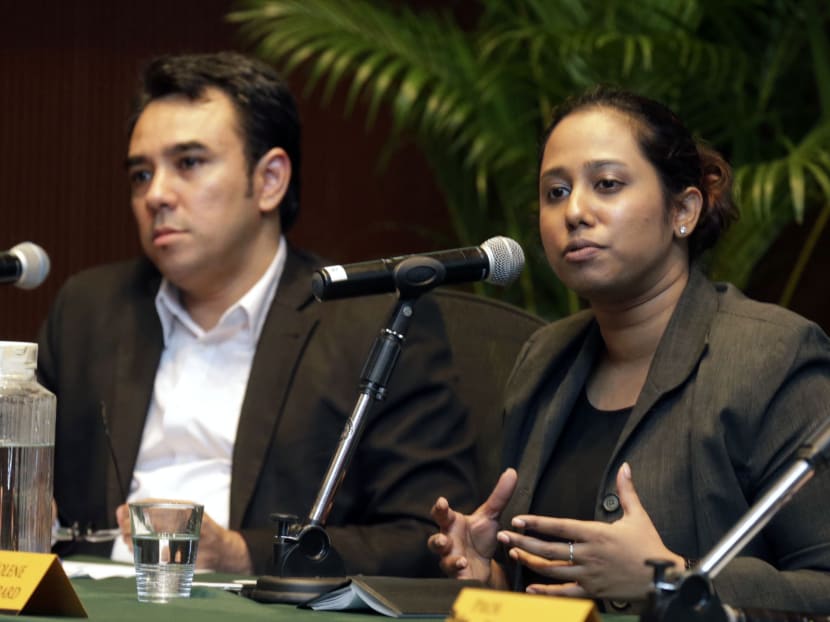ISIS a draw for young Singaporeans with troubled backgrounds: Expert
SINGAPORE — The question of what motivates “a young Malay boy” living in peaceful Singapore to seek to wage jihad in Syria and Iraq was posed during a ISIS and Islam-themed forum at the National University of Singapore (NUS) today (Feb 16), where participants discussed the allure of Islamic State (ISIS) to Muslims worldwide.

Dr Mohamed Bin Ali, left, from the Studies in Inter-Religious Relations in Plural Societies Programme at the S Rajaratnam School of International Studies (RSIS), Dr Jolene Jerard, right, from the International Centre for Political Violence and Terrorism Research, RSIS at the Tembusu Forum titled “ISIS & Islam” on Feb 16, 2016. Photo: Wee Teck Hian
SINGAPORE — The question of what motivates “a young Malay boy” living in peaceful Singapore to seek to wage jihad in Syria and Iraq was posed during a ISIS and Islam-themed forum at the National University of Singapore (NUS) today (Feb 16), where participants discussed the allure of Islamic State (ISIS) to Muslims worldwide.
The question was posed by former Nominated Member of Parliament Zulkifli Baharudin to panellists at the Tembusu Forum, organised by NUS’ Tembusu College. The panellists were Dr Mohamed Ali, an assistant professor at the S. Rajaratnam School of International Studies (RSIS), Dr Jolene Jerard, an RSIS research fellow, and Dr Nazirudin Mohd Nasir from the Office of the Mufti, Islamic Religious Council of Singapore (MUIS).
Said Mr Zulkifli: “What puzzles many of us in Singapore is that we live in a (peaceful) place like this. What motivates a young Malay boy to want to do this? We’ve got better things to do in our lives...We go to the same school, we go to the same hawker centres… and suddenly, we find that they’re not one of us.”
In response, Dr Mohamed said that many youths come from a problematic family background, and lack a sense of belonging. They also possess an anti-establishment streak, he noted in his work with youths as the vice-chairman of the Religious Rehabilitation Group.
Dr Jerard pointed out two camps of new recruits. One group falls for the “calculated” media strategy of the militants, “where they come up with images that look as if they come from computer games”. The other group, on the other hand, harks from a family of extremists.
Women also form an emerging group of new entrants, said Dr Jerard. In the Middle East, women view ISIS as a way out of poverty. In the West, they feel alienated by their own communities, and are imbued with “a sense of purpose” in wanting to raise the new generation of militants.
“For many of these women, especially in Asia, the interesting part is that kinship plays a strong role. They tend to follow their husbands and their family there, as opposed to the discourse in the west, where women come out because they feel a sense of empowerment,” she said, adding that the notion of marrying a warrior also features heavily in this picture.
Cyberspace – where ISIS extremist narratives are rampant - remains an important battleground to counter ISIS locally, said Dr Mohamed. Youths are a critical group in this so-called battle, given that their media-savviness.
Dr Jerard added: “In a generation of fighters who are digital natives, the tactile use and very clever marketing use of the Internet as well as social media platform have escalated their cause, and made certainly more rapid their radicalisation and ultimately, mobilisation into action.”
Preventive efforts have to be continued, Dr Mohamed added. “I believe prevention before radicalisation is better than rehabilitation after indoctrination. Once the ideology is deeply rooted in the mind, it’s an uphill task to remove it.”
Addressing a question from the floor on whether putting ISIS in the spotlight was giving voice to the terror group, Dr Mohamed said that speaking against ISIS did not lend it legitimacy. “ISIS has been hijacking Islam and the teachings of Islam. We need to continue speaking against ISIS in Singapore,” he said.
The forum, moderated by Ambassador-at-Large Tommy Koh, was attended by 330 NUS students and guests, including Mr Zulkifli and former Senior Minister of State for Foreign Affairs Zainul Abidin Rasheed.






